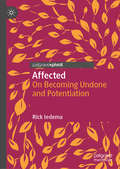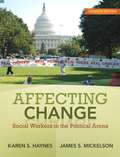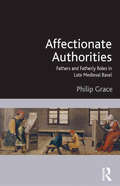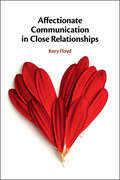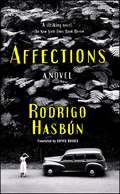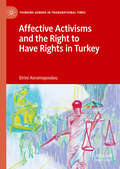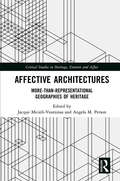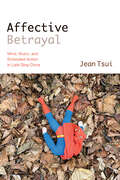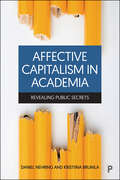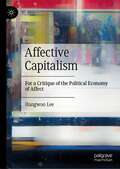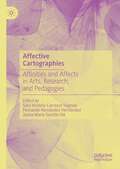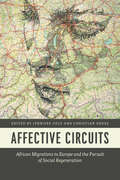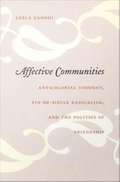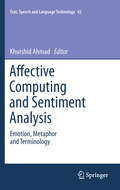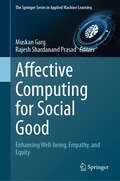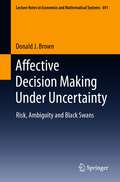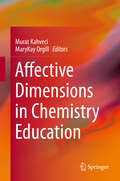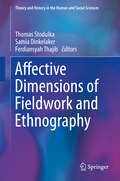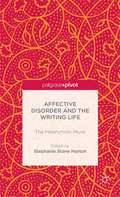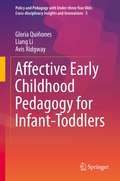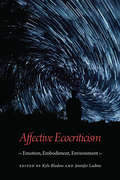- Table View
- List View
Affected: On Becoming Undone and Potentiation
by Rick IedemaThis book explores the implications and relevancies of personal affect and organisational complexity for navigating organisational processes, relationships, changes and aspirations. In today’s climate, worker roles, relations and responsibilities are becoming increasingly complex and variable. Using personal experiences of organisational conflict as a point of departure, this book reflects on organisational change, complexity and research.It moves from experiential towards theoretical and methodological issues, exploring the question of how to confront and intervene in organisational complexity. Among others, the main theories brought to bear on this question include complexity theory, affect theory and sphere theory (or ‘spherology’). The research approaches and methodologies discussed include anthropology/ethnography, discourse studies, visual research and (the turn to) participatory enquiry.The book’s main message is to advocate for a collaborative, affective, visualised and future-oriented research agenda that rejects the conventional objectivist break and ‘division of learning’ characterising researcher-researched relationships. It will appeal to students and academics working in the fields of alternative research methods, the social sciences, organisational studies and management theory.
Affecting Change: Social Workers in the Political Arena
by Karen S. Haynes James S. MickelsonUpdated to reflect advances in a changing political arena of Obama's administration, this revision shows students how to develop political action skills and to take advantage of the opportunity of change. This practical, step-by-step guide focuses on advocacy as the central mission of social work practice. New material and 17 new personal scenarios involving social workers who have made a difference-senators, representatives, and officials in the political arena-serve to inspire students. Revised chapters show how social work skills can be most effective, whether by impacting the political arena as a social worker or running for office.
Affecting Grace
by Kenneth C. CalhoonAffecting Grace examines the importance of Shakespeare's poetry and plays within German literature and thought after 1750 - including its relationship to German classicism, which favoured unreflected ease over theatricality. Kenneth S. Calhoon examines this tension against an extensive backdrop that includes a number of canonical German authors - Goethe, Schiller, Herder, Lessing, von Kleist, and Nietzsche - as well as the advent of Meissen porcelain, the painting of Bernardo Bellotto and Francesco Guardi, and aspects of German styles of architecture.Extending from Shakespeare's The Merchant of Venice (c. 1597) to Kleist's The Broken Jug (1806), this study turns on the paradox that the German literary world had begun to embrace Shakespeare just as it was firming up the broad but pronounced anti-Baroque sensibility found pivotally in Lessing's critical and dramatic works. Through these investigations, Calhoon illuminates the deep cultural changes that fundamentally affected Germany's literary and artistic traditions.
Affection and Trust: The Personal Correspondence of Harry S. Truman and Dean Acheson, 1953-1971
by Dean Acheson Harry S. TrumanPublished for the first time: the personal letters of President Harry S. Truman and his secretary of state, Dean Acheson, from 1953, the year when both were newly out of office, until Acheson's death at the age of 78 in 1971.
Affection: An Erotic Memoir
by Krissy KneenKrissy Kneen loves sex . . . and she's not afraid to talk about it. In this sometimes hilarious, sometimes poignant, and sometimes terrifying memoir, she traces the arc of her sexual life - from her childhood in a sexless household to the myriad sexual encounters of her young and adult life to the present, in which she is a married (and monogamous) 40-year-old woman. Raised by a group of protective and eccentric women who expressly forbade any and every sign of sexuality, Krissy - an unusually sensual young girl - discovered early on that illicit pleasures are the best kind. Affection follows the path of Kneen's life journey, from the compulsive sexual self-exploration of her childhood to her experiences as a young woman for whom the world is a sexual playground. Underlying the jaw-dropping details of her many sexual escapades is Kneen's examination of how her sense of self shapes and is shaped by those experiences, and of her struggle to satisfy her own needs in the face of a limiting, and often judgmental, society. Affection is a frank, often erotic look at one woman's sexuality as she grows and changes in a world that continues to see only the young and the beautiful amongst us as sexual beings - and a chronicle of her refusal to conform to that misconception.
Affectionate Authorities: Fathers and Fatherly Roles in Late Medieval Basel
by Philip GraceIn one of his sermons, the medieval preacher Bernardino of Siena listed seven ’fathers’ to whom one owed obedience: God, one’s natural father, godfather, confessor, benefactor, a government official, and any elderly man. This book seeks to answer the question of why medieval Europeans saw the need for so many ’fathers.’ Why was fatherhood so appealing as a metaphor? Situated at the intersection of social and cultural history, the study draws upon a variety of late-medieval and early-modern sources including witness depositions, personal letters and pedagogical treatises from the city of Basel, Switzerland. It focuses on how people from different walks of life invoked ideas about fatherhood in the pursuit of various goals - not only the ideological agendas of scholarly elites, but also the more pragmatic problems of closing a business deal, claiming an inheritance, or choosing sides in a fistfight - before turning to what these ideas reveal about fatherhood ’on the ground.’ The book argues that it was precisely fatherhood’s basis in lived experience that gave it a familiar ’shape’ in the several roles that fathers played, including provision, affection, disciplinary authority, and education. The most potent rhetorical aspect of fatherhood, however, was not as a static image or shape, but rather the possibility of invoking connections between one role and another. The most potent connection between roles was the idea that fathers were 'affectionate authorities,' combining power over subordinates with desire for their well-being. Tracing the connections and contradictions of these identities, this study provides a nuanced view of concepts of fatherhood on the eve of the Reformation.
Affectionate Communication in Close Relationships
by Kory FloydFew communication behaviors are more consequential to the development and maintenance of close relationships than the expression of affection. Indeed, people often use affectionate gestures to initiate or accelerate relationship development. In contrast, the absence of affection in established relationships frequently coincides with relational deterioration. This text explores the scientific research on affection exchange that has emerged from the disciplines of communication, social and clinical psychology, family studies, psychophysiology, sociology, nursing, and behavioral health. Specific points of focus include the individual and relational benefits - including health benefits - of affectionate behavior, the significant detriments associated with lacking sufficient affection, and the risks of expressing affection. It also discusses the primary social and cultural influences on affection exchange, critiques principal theories and measurement models, and offers suggestions for future empirical research.
Affections: A Novel
by Rodrigo Hasbún Sophie HughesA haunting novel about an unusual family’s breakdown—set in South America during the time of Che Guevara and inspired by the life of Third Reich cinematographer Hans Ertl—from the literary star Jonathan Safran Foer calls, “a great writer.”Inspired by real events, Affections is the story of the eccentric, fascinating Ertl clan, headed by the egocentric and extraordinary Hans, once the cameraman for the Nazi propagandist Leni Riefenstahl. Shortly after the end of World War II, Hans and his family flee to Bolivia to start over. There, the ever-restless Hans decides to embark on an expedition in search of the fabled lost Inca city of Paitití, enlisting two of his daughters to join him on his outlandish quest into the depths of the Amazon, with disastrous consequences. Set against the backdrop of the both optimistic and violent 1950s and 1960s, Affections traces the Ertls’s slow and inevitable breakdown through the various erratic trajectories of each family member: Hans’s undertakings of colossal, foolhardy projects and his subsequent spectacular failures; his daughter Monika, heir to his adventurous spirit, who joins the Bolivian Marxist guerrillas and becomes known as “Che Guevara’s avenger”; and his wife and two younger sisters left to pick up the pieces in their wake. In this short but powerful work, Hasbún weaves a masterfully layered tale of how a family’s voyage of discovery ends up eroding the affections that once held it together.
Affective Activisms and the Right to Have Rights in Turkey (Thinking Gender in Transnational Times)
by Eirini AvramopoulouThis book presents a novel approach to the study of contemporary social movements and activism. Based on extensive ethnographic research of the life and politics of feminist, LGBTQI+, and women’s religious groups in Istanbul from 2007 to 2015, it explores the affects, meanings, and interpretations these groups express in their activism—in particular, their strategic use of human rights’ language to claim institutional and social legitimacy and their reinterpretation of gender/queer theory across politics of difference to make sense of global dynamics that affect their everyday lives. Chapters interweave personal accounts and life histories of individual activists with specific historical events to demonstrate the activists’ dissidence regarding the conditions that have defined their differently marginalised positions in Turkey and the significance of the formation of unexpected alliances. The ambivalent, yet inescapable, bargaining tool of rights is analysed as a demand over affective democratic visions, citizenship and a life worth living, and thus the right to have rights, as it is argued, pushes us to reflect on how power works when the political and affective surplus value invested in the need to rethink of rights (even beyond human rights themselves) lies both in the search for ways of institutionalising and implementing rightful demands, as well as in outlining more affective visions of political resistance. By arguing that activism is a performative and affective language that is defined by intersectional hopes, desires and dreams, as much as it engages with legal battles that define who or what might appear as being broken under specific historical and social settings, Affective Activisms employs gender and sexuality as analytical tools to make sense of local and transnational politics of resistance in the face of the re-emergence of authoritarian regimes, sexual harassment, gender violence, homo/trans phobia, and Islamophobia in Turkey and worldwide. It will be of interest to students and scholars across the fields of women's, gender and sexuality studies, queer theory, critical human rights and political theory, sociology, and social anthropology.
Affective Architectures: More-Than-Representational Geographies of Heritage (Critical Studies in Heritage, Emotion and Affect)
by Jacque Micieli-Voutsinas Angela M. PersonHow do places manipulate our emotions? How are spaces affectious in their articulation and design? This book provides theoretical frameworks for exploring affective dimensions of architectural sites based on the notion that heritage, as an embodied experience, is embedded in places and spaces. Drawing together an interdisciplinary collection of essays spanning geographically diverse architectural sites — including Ford’s Theater, the site of President Lincoln’s assassination; the Estadio Nacional of Santiago, Chile, where 12,000 detainees were held following the ouster of President Salvador Allende; and Unit 731, the site of a biological and chemical warfare research unit of the Imperial Japanese army in Harbin, China, amongst others — this edited collection assembles critical dialogue amongst scholars and practitioners engaging in affective and other more-than-representational approaches to cultural memory, heritage, and identity-making. Broken into three main sections: Affective Politics; Embedded Geographies; and Affective Methodologies, this book draws together multidisciplinary perspectives from the arts, social sciences and humanities to understand the role of architecture in generating embodied experiences at places of memory. This book offers interdisciplinary perspectives on fundamental questions of memory, identity and space. It will be of interest to students and scholars in the fields of geography, architecture, cultural studies, and museum and heritage studies.
Affective Betrayal: Mind, Music, and Embodied Action in Late Qing China (SUNY series in Chinese Philosophy and Culture)
by Jean TsuiAffective Betrayal uses "affect" as an analytical category to explicate the fragility and fragmentation of Chinese political modernity. In so doing, the book uncovers some of the unresolved moral and philosophical obstacles China encountered in the past, as well as the cultural predicament the country faces at present.At the turn of the twentieth century, China's leading reformer Liang Qichao (1873–1929) presented modern political knowledge in musical and visual representational formats that were designed to stimulate readers' bodily senses. By expanding the reception of textual knowledge from "reading" to "listening" and "visualizing experiences," Liang generated an epistemic shift, and perhaps an all-inclusive internal intellectual, philosophical, and moral transition, alongside China's modern political reform. By tracing the marginalized academic and philosophical positions Liang sought to restore in China's incipient democratic movement, Affective Betrayal examines how his attempts to conjoin Confucian morality and liberal democracy expose hidden anxieties as well as inherent contradictions between these two systems of thought. These conflicts, besides disrupting the stability of China's burgeoning modern political order, explain why the import of modern concepts led to China's continued political impasse, rather than rationality and progress, after the 1911 revolution.
Affective Capitalism in Academia: Revealing Public Secrets
by Daniel Nehring and Kristiina BrunilaDrawing on affect theory and research on academic capitalism, this book examines the contemporary crisis of universities. Moving through 11 international and comparative case studies, it explores diverse features of contemporary academic life, from the coloniality of academic capitalism to performance management and the experience of being performance-managed. Affect has emerged as a major analytical lens of social research. However, it is rarely applied to universities and their marketisation. Offering a unique exploration of the contemporary role of affect in academic labour and the organisation of scholarship, this book considers modes of subjectivation, professional and personal relationships and organisational structures and their affective charges. Chapter 9 is available Open Access via OAPEN under CC-BY-NC-ND licence.
Affective Capitalism: For a Critique of the Political Economy of Affect
by Hangwoo LeeDrawing on Tarde's and Deleuze’s monadology, this book investigates the affective turn of contemporary capitalism. The concept of affect provides critical insight to overcome the limitations of social constructivism and cognitive capitalism. Affective capitalism transforms the population’s everyday bodily experiences into quantitative metrics that can be observed, measured, and processed on a non-conscious register, turning them into dividuals prepared to react and be affected by specific information at a given moment. In an era where social wealth increasingly relies on the 'social factory,' algorithms and big data constitute the living labor beyond employment. This book argues that affect also holds a potential for dismantling today’s real subsumption of life by capital. The network effect, mostly actualized as a company's market capitalization, is constantly traversed by the molecular becoming of affect, leading to new assemblages, such as free software movement, decentralized platforms, peer-to-peer networking, blockchain, and universal basic income.
Affective Cartographies: Affinities and Affects in Arts, Research, and Pedagogies
by Sara Victoria Carrasco Segovia Fernando Hernández Hernández Juana María Sancho-GilThis book focuses on cartographies as epistemology and visual strategy, highlighting three major axes: corporeal, affective, and nomadic learning. Based on the onto-episte-methodological and ethical displacement from reductive approaches, the book emphasizes new ways of understanding arts, research, teaching and learning processes at the university and beyond. Contributions highlight practices focused on dialogue, sharing, readings and philosophical discussions which allow educators to move away from what is typically thought of as ‘correct’, and reinforce the importance of a decolonized approach to learning and knowledge, understanding the (re)search process as an imperfect journey in becoming.
Affective Circuits: African Migrations to Europe and the Pursuit of Social Regeneration
by Jennifer Cole Christian GroesThe influx of African migrants into Europe in recent years has raised important issues about changing labor economies, new technologies of border control, and the effects of armed conflict. But attention to such broad questions often obscures a fundamental fact of migration: its effects on ordinary life. Affective Circuits brings together essays by an international group of well-known anthropologists to place the migrant family front and center. Moving between Africa and Europe, the book explores the many ways migrants sustain and rework family ties and intimate relationships at home and abroad. It demonstrates how their quotidian efforts--on such a mass scale--contribute to a broader process of social regeneration. The contributors point to the intersecting streams of goods, people, ideas, and money as they circulate between African migrants and their kin who remain back home. They also show the complex ways that emotions become entangled in these exchanges. Examining how these circuits operate in domains of social life ranging from child fosterage to binational marriages, from coming-of-age to healing and religious rituals, the book also registers the tremendous impact of state officials, laws, and policies on migrant experience. Together these essays paint an especially vivid portrait of new forms of kinship at a time of both intense mobility and ever-tightening borders.
Affective Communities in World Politics
by Emma HutchisonEmotions underpin how political communities are formed and function. Nowhere is this more pronounced than in times of trauma. The emotions associated with suffering caused by war, terrorism, natural disasters, famine and poverty can play a pivotal role in shaping communities and orientating their politics. This book investigates how 'affective communities' emerge after trauma. Drawing on several case studies and an unusually broad set of interdisciplinary sources, it examines the role played by representations, from media images to historical narratives and political speeches. Representations of traumatic events are crucial because they generate socially embedded emotional meanings which, in turn, enable direct victims and distant witnesses to share the injury, as well as the associated loss, in a manner that affirms a particular notion of collective identity. While ensuing political orders often re-establish old patterns, traumatic events can also generate new 'emotional cultures' that genuinely transform national and transnational communities.
Affective Communities: Anticolonial Thought, Fin-de-Siècle Radicalism, and the Politics of Friendship
by Leela Gandhi"If I had to choose between betraying my country and betraying my friend, I hope I should have the guts to betray my country. " So E. M. Forster famously observed in his Two Cheers for Democracy. Forster's epigrammatic manifesto, where the idea of the "friend" stands as a metaphor for dissident cross-cultural collaboration, holds the key, Leela Gandhi argues in Affective Communities, to the hitherto neglected history of western anti-imperialism. Focusing on individuals and groups who renounced the privileges of imperialism to elect affinity with victims of their own expansionist cultures, she uncovers the utopian-socialist critiques of empire that emerged in Europe, specifically in Britain, at the end of the nineteenth century. Gandhi reveals for the first time how those associated with marginalized lifestyles, subcultures, and traditions--including homosexuality, vegetarianism, animal rights, spiritualism, and aestheticism--united against imperialism and forged strong bonds with colonized subjects and cultures. Gandhi weaves together the stories of a number of South Asian and European friendships that flourished between 1878 and 1914, tracing the complex historical networks connecting figures like the English socialist and homosexual reformer Edward Carpenter and the young Indian barrister M. K. Gandhi, or the Jewish French mystic Mirra Alfassa and the Cambridge-educated Indian yogi and extremist Sri Aurobindo. In a global milieu where the battle lines of empire are reemerging in newer and more pernicious configurations, Affective Communities challenges homogeneous portrayals of "the West" and its role in relation to anticolonial struggles. Drawing on Derrida's theory of friendship, Gandhi puts forth a powerful new model of the political: one that finds in friendship a crucial resource for anti-imperialism and transnational collaboration.
Affective Computing and Sentiment Analysis: Emotion, Metaphor and Terminology (Text, Speech and Language Technology #45)
by Khurshid AhmadThis volume maps the watershed areas between two 'holy grails' of computer science: the identification and interpretation of affect - including sentiment and mood. The expression of sentiment and mood involves the use of metaphors, especially in emotive situations. Affect computing is rooted in hermeneutics, philosophy, political science and sociology, and is now a key area of research in computer science. The 24/7 news sites and blogs facilitate the expression and shaping of opinion locally and globally. Sentiment analysis, based on text and data mining, is being used in the looking at news and blogs for purposes as diverse as: brand management, film reviews, financial market analysis and prediction, homeland security. There are systems that learn how sentiments are articulated. This work draws on, and informs, research in fields as varied as artificial intelligence, especially reasoning and machine learning, corpus-based information extraction, linguistics, and psychology.
Affective Computing for Social Good: Enhancing Well-being, Empathy, and Equity (The Springer Series in Applied Machine Learning)
by Muskan Garg Rajesh Shardanand PrasadAffective Computing for Social Good: Enhancing Well-being, Empathy, and Equity offers an insightful journey into the intricate realm of affective computing. It covers a spectrum of topics ranging from foundational theories and technologies to ethical considerations and future possibilities. Beginning with "Deciphering the Emotional Spectrum: Advances in Emotion Science and Analysis," it sets the stage by tracing the evolution of understanding human emotions. Subsequent chapters explore practical applications, such as integrating clinical psychology with affective computing for therapeutic progress and leveraging affective computing in diagnosing and managing mood disorders more efficiently. As the narrative unfolds, the book emphasizes the crucial role of affective computing in fostering social justice and equity. It underscores the need for developing inclusive algorithms and databases while addressing ethical challenges like privacy, consent, and the risk of emotional manipulation. These discussions emphasize the significance of ethical deployment and regulation. The book also covers the technical aspects and applications of affective computing, including natural language processing for emotion recognition and analysis, voice emotion detection, and visual emotion recognition. It extends to applications, such as the use of affective computing in health management via recommender systems and personalized well-being interventions in mental health care. Addressing data challenges, "Enhancing Affective Computing with Data Augmentation: Strategies for Overcoming Limited Data Availability" presents solutions for imbalances affecting model performance. "Advancements in Multimodal Emotion Recognition" highlights the integration of facial expressions with physiological signals to improve emotion recognition accuracy and reliability. Concluding with "Ethical Considerations in Affective Computing" and "Cognitive Currents: A Path from Neuroscience to Consciousness," the book connects technical advancements in affective computing with broader ethical and philosophical inquiries surrounding consciousness and the human experience. Features: Helps readers understand the potential benefits of emotionally intelligent AI systems, such as improving mental health care, enhancing education, or promoting more ethical decision-making. Addresses ethical considerations related to the development and deployment of emotionally intelligent AI systems, helping readers to become more aware of the potential risks and trade-offs involved. Presents new approaches or frameworks for developing emotionally intelligent AI systems, providing readers with innovative ideas and perspectives. Provides examples of successful case studies where emotionally intelligent AI systems were used for social good, which may inspire readers to think about how they can contribute to society through AI development. Overall, this book will help readers gain a deeper understanding of the intersection between AI and human emotions, and how this technology can be used to create a more empathetic, compassionate, and socially responsible world.
Affective Decision Making Under Uncertainty: Risk, Ambiguity and Black Swans (Lecture Notes in Economics and Mathematical Systems #691)
by Donald J. BrownThis book is an exploration of the ubiquity of ambiguity in decision-making under uncertainty. It presents various essays on behavioral economics and behavioral finance that draw on the theory of Black Swans (Taleb 2010), which argues for a distinction between unprecedented events in our past and unpredictable events in our future. The defining property of Black Swan random events is that they are unpredictable, i.e., highly unlikely random events. In this text, Mandelbrot’s (1972) operational definition of risky random unpredictable events is extended to Black Swan assets – assets for which the cumulative probability distribution or conditional probability distribution of random future asset returns is a power distribution. Ambiguous assets are assets for which the uncertainties of future returns are not risks. Consequently, there are two disjoint classes of Black Swan assets: Risky Black Swan assets and Ambiguous Black Swan assets, a new class of ambiguous assets with unpredictable random future outcomes. The text is divided into two parts, the first of which focuses on affective moods, introduces affective utility functions and discusses the ambiguity of Black Swans. The second part, which shifts the spotlight to affective equilibrium in asset markets, features chapters on affective portfolio analysis and Walrasian and Gorman Polar Form Equilibrium Inequalities. In order to gain the most from the book, readers should have completed the standard introductory graduate courses on microeconomics, behavioral finance, and convex optimization. The book is intended for advanced undergraduates, graduate students and post docs specializing in economic theory, experimental economics, finance, mathematics, computer science or data analysis.
Affective Dimensions in Chemistry Education
by Murat Kahveci Marykay OrgillThis is a unique resource for those wishing to address the affective domain as they research and solve problems in chemistry education. Contributions by world-leading experts cover both fundamental considerations and practical case studies. This work fills a gap in the literature of chemistry education, which so far has focussed mainly on the cognitive domain. The affective domain refers to feelings-based constructs such as attitudes, values, beliefs, opinions, emotions, interests, motivation, and a degree of acceptance or rejection. It can affect students' interest in science topics and their motivation to persevere in learning science concepts.
Affective Dimensions of Fieldwork and Ethnography (Theory and History in the Human and Social Sciences)
by Thomas Stodulka Samia Dinkelaker Ferdiansyah ThajibThis book illustrates the role of researchers’ affects and emotions in understanding and making sense of the phenomena they study during ethnographic fieldwork. Whatever methods ethnographers apply during field research, however close they get to their informants and no matter how involved or detached they feel, fieldwork pushes them to constantly negotiate and reflect their subjectivities and positionalities in relation to the persons, communities, spaces and phenomena they study. The book highlights the idea that ethnographic fieldwork is based on the attempt of communication, mutual understanding, and perspective-taking on behalf of and together with those studied. With regard to the institutionally silenced, yet informally emphasized necessity of ethnographers’ emotional immersion into the local worlds they research (defined as “emic perspective,” “narrating through the eyes of the Other,” “seeing the world from the informants’ point of view,” etc.), this book pursues the disentanglement of affect-related disciplinary conventions by means of transparent, vivid and systematic case studies and their methodological discussion. The book provides nineteen case studies on the relationship between methodology, intersubjectivity, and emotion in qualitative and ethnographic research, and includes six section introductions to the pivotal issues of role conflict, reciprocity, intimacy and care, illness and dying, failing and attuning, and emotion regimes in fieldwork and ethnography. Affective Dimensions of Fieldwork and Ethnography is a must-have resource for post-graduate students and researchers across the disciplines of social and cultural anthropology, medical anthropology, psychological anthropology, cultural psychology, critical theory, cultural phenomenology, and cultural sociology.
Affective Disorder and the Writing Life: The Melancholic Muse
by Stephanie Stone HortonAffective Disorder and the Writing Life interrogates the mythos of the 'mad writer' through lived experience, literary analysis, writerly reflection and contemporary neuroscience. It explores how affective disorders colour, drive and sometimes silence the writing mind - and how affective difference has always informed the literary imagination.
Affective Early Childhood Pedagogy for Infant-Toddlers (Policy and Pedagogy with Under-three Year Olds: Cross-disciplinary Insights and Innovations #3)
by Avis Ridgway Gloria Quiñones Liang LiThis exciting new book brings fresh knowledge of affective pedagogies in early childhood education and care. The book draws on cultural-historical theory in alignment with visual methodologies to elucidate infant-toddlers’ affective pedagogies through analysis of case examples. The book reveals contemporary pedagogical practices in the infant-toddler space like mealtimes, nappy change and play. These pedagogical practices show the highly specialised nature of working with infant-toddlers such as the affective relations between educators and infant-toddlers, affective dialogue, affective engagement, and the creation of affective spaces. The value of collaboration is highlighted through creating an affective space for educators to become aware, reflect and position themselves as effective and affective educators. The book introduces innovative methodological tools such as images and collective drawings for collaborative reflection.
Affective Ecocriticism: Emotion, Embodiment, Environment
by Kyle Bladow Jennifer LadinoScholars of ecocriticism have long tried to articulate emotional relationships to environments. Only recently, however, have they begun to draw on the complex interdisciplinary body of research known as affect theory. Affective Ecocriticism takes as its premise that ecocritical scholarship has much to gain from the rich work on affect and emotion happening within social and cultural theory, geography, psychology, philosophy, queer theory, feminist theory, narratology, and neuroscience, among others. This vibrant and important volume imagines a more affective—and consequently more effective—ecocriticism, as well as a more environmentally attuned affect studies. These interdisciplinary essays model a range of approaches to emotion and affect in considering a variety of primary texts, including short story collections, films, poetry, curricular programs, and contentious geopolitical locales such as Canada’s Tar Sands. Several chapters deal skeptically with familiar environmentalist affects like love, hope, resilience, and optimism; others consider what are often understood as negative emotions, such as anxiety, disappointment, and homesickness—all with an eye toward reinvigorating or reconsidering their utility for the environmental humanities and environmentalism. Affective Ecocriticism offers an accessible approach to this theoretical intersection that will speak to readers across multiple disciplinary and geographic locations.
